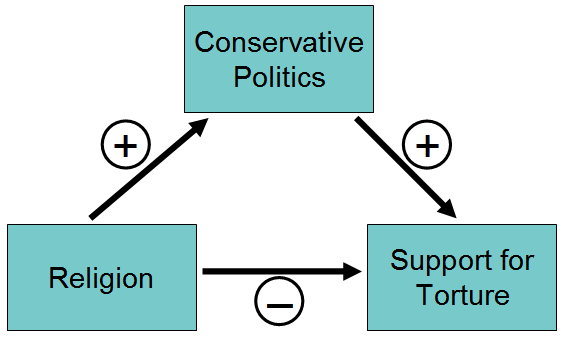So, what do you think? Are the religious in America more or less likely than average to support the use of torture?
To find out, Arial Malka (Yeshiva University, New York) and Christopher Soto (Colby College, Waterville, Maine) used data from a couple of opinion polls, one conducted in 2004 for ABC News/Washington Post and a larger one (nearly 2,000 people) conducted in 2008 (the 2008 American National Election Studies time series).
Here’s an example of what they asked (this is from the 2004 poll):
“Some people say it’s acceptable to torture people suspected of terrorism, in cases where other methods have failed and the authorities believe the suspect has information that could prevent terrorist attacks and save lives. Other people say the use of torture is never acceptable because it’s cruel, it may violate international law, it may not work, and it could be used unnecessarily or by mistake on innocent people.”
Well, it turns out that, in both surveys, religious Americans were actually slightly less likely than the less religious to condone torture (they measured religion using a composite of attendance, prayer, and subjective ratings of importance). But that’s only half the story.
They were also interested in the interaction with political persuasion (liberal or conservative), and they tested this using a statistical technique that allows you to check if one variable (in this case, religiosity) might be influencing another variable (in this case, attitudes to torture) only indirectly – via its effects on a third variable (political persuasion).
What they found was consistent with a set up where religion makes people conservative, and that in turn makes them support torture. In other words, religion has a direct and an indirect effect. Basic religion (in their model) opposes torture, but it also religion increases support for conservative politics. As a result, it indirectly increases support for torture.
What’s more, this indirect effect was much stronger in in educated people. In educated people, religion is more likely to be linked to conservative views, and conservative views are more likely to be linked to support for torture.
In my view, the real interest in these results is that they underscore once again just how complex religion is. I think that the motives for educated people to embrace religion differ from the motives of the less educated.As a result, the kind of religion they have, and the purposes they put it too, are different.
They make religion in their own image.
![]()
Malka A, & Soto CJ (2011). The Conflicting Influences of Religiosity on Attitude Toward Torture. Personality & Social Psychology Bulletin PMID: 21525330
 This article by Tom Rees was first published on Epiphenom. It is licensed under Creative Commons.
This article by Tom Rees was first published on Epiphenom. It is licensed under Creative Commons.















